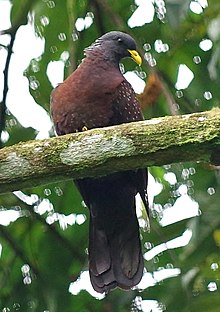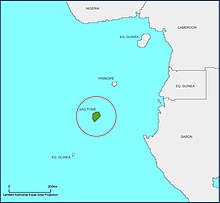| São Tomé olive pigeon | |
|---|---|

| |
| Conservation status | |
 Endangered (IUCN 3.1) | |
| Scientific classification | |
| Domain: | Eukaryota |
| Kingdom: | Animalia |
| Phylum: | Chordata |
| Class: | Aves |
| Order: | Columbiformes |
| Family: | Columbidae |
| Genus: | Columba |
| Species: | C. thomensis |
| Binomial name | |
| Columba thomensis Barboza du Bocage, 1888 | |

| |
| range | |
The São Tomé olive pigeon or maroon pigeon (Columba thomensis) is an endangered species of pigeon which is endemic to the island of São Tomé off the coast of western Africa. It was described by José Vicente Barbosa du Bocage in 1888.
Description
The bird is 37 to 40 centimetres (15 to 16 in) long.
Distribution
The olive pigeon occurs in several parts of the island of São Tomé, including the northwest (Chamiço), the central massif (Lagoa Amelia, Zampalma, Nova Ceilão, Bombaim and the valley of Rio Io Grande near Formoso Pequeno), the southwest (valleys of the rivers Xufexufe and Ana Chaves) and in the southeast (west of Água Izé, on Pico Maria Fernandes and north of São João dos Angolares).
Conservation and status
The continued survival of the São Tomé olive pigeon depends upon stopping habitat loss in the remaining lowland rainforest of São Tomé, as does the survival of three other birds: the São Tomé ibis, São Tomé oriole, and São Tomé scops owl.
References
- BirdLife International (2018). "Columba thomensis". IUCN Red List of Threatened Species. 2018: e.T22690138A131461892. doi:10.2305/IUCN.UK.2018-2.RLTS.T22690138A131461892.en. Retrieved 20 November 2021.
- ^ BirdLife International, Species Factsheet Columba thomensis, accessed 17 January 2019
- Kirby, Alex. "Many threatened birds 'need help'", BBC News (March 8, 2004).
Further reading
- Bocage, 1888 : Oiseaux nouveaux de l'île St. Thomé. Jornal de Sciencias Mathematicas, Physicas e Naturaes, Academia Real das Sciencias de Lisboa, vol. XII, n. 48, p. 229-232.
- del Hoyo J., Elliott A. & Sargatal J. (1997) Handbook of the Birds of the World, Volume 4, Sandgrouse to Cuckoos. BirdLife International, Lynx Edicions, Barcelona, p. 679
- Prin J. & G. (1997) Encyclopédie des Colombidés. Prin, Ingré, p. 55